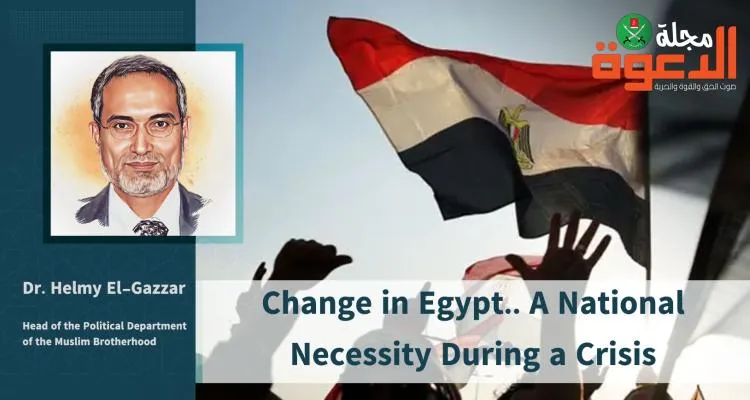

Change in Egypt.. A National Necessity During a Crisis
Dr. Helmy El-Gazzar, Head of the Political Department of the Muslim Brotherhood
When we talk about change in Egypt today, we do not rely on a single vision alone but rather on an understanding of the magnitude of the challenges facing our beloved country and a deep awareness of the significant responsibility placed on all of us—government, opposition, and the people. The current crisis in Egypt demands that everyone, without exception, contribute to transforming the country from one state to another.
Change has become a duty driven by circumstances and necessity. When a nation recognizes its need for progress and advancement, it must reflect on itself, realign its priorities, and pursue a new vision. Today, at this pivotal moment in our nation's history, we have a genuine opportunity to reshape the national landscape and strive tirelessly for a brighter future for Egypt.
It is no secret that the Egyptian regime is facing increasing internal and external crises. The ongoing economic crisis has become a strain on Egyptian citizens, the absence of political freedoms has become a reality, and the lack of prospects for national forces has become a defining characteristic of this period. The level of political and social tension is unprecedented and is strikingly widespread across the country.
Almost all groups have voiced their dissatisfaction with this situation, and the range of opposition has broadened to include civil society, both liberal and leftist, as well as Islamist movements. Professional and labor unions are also feeling a sense of discontent due to laws limiting freedoms. Meanwhile, regional and international challenges are intensifying the pressures on Egypt and restricting its capacity to address crises and find solutions.
Given these conditions, true national alignment is more urgent than ever. This alignment can only be attained through serious dialogue, authentic political openness, and a sincere effort to find radical solutions to pull the country out of its crisis. However, the central dilemma lies in the regime's lack of true political will to engage in a profound reform process. The ruling mentality remains trapped by the fear of a repeat of the January 2011 scenario, which drives it to further isolation and a desperate grasp on power, even at the expense of the nation's stability and future.
One of the most obvious signs of the political deadlock is the ongoing detention of thousands of Egyptians in inhumane conditions, many of whom are national talents and experts contributing positively to this troubled nation. Among them are more than ninety members of parliament elected by millions of Egyptians in free and democratic elections, as well as scholars, experts, ministers, and other notable figures. Renowned human rights organizations denounce these violations against detainees, holding the regime legally and morally accountable, especially since this repression also affects an opposition that previously gained power through free elections.
The issue of these detainees has become a concern for every free Egyptian, and their release has become a legitimate demand of all honorable, patriotic politicians. It is time for the regime to send a positive message to the political and national community by releasing these detainees, especially those held in long-term pretrial detention, women, and the elderly. Issuing comprehensive release orders would be a first step toward restoring the lost trust between the regime and political forces.
The opposition bears significant responsibility as well. The duty of coordination and joint action to build a unified national front has become a national necessity. We must not repeat past mistakes or let ideological differences hinder national unity. We witnessed how the coordination among national forces before the January Revolution led to the success of the political and popular movement, as Islamist movements joined other political forces on a unified national platform.
True change begins with a sincere will and a belief that the homeland belongs to all its citizens, not the monopoly of a particular faction or regime. God Almighty says: "Indeed, Allah will not change the condition of a people until they change what is in themselves" (Al-Ra'd: 11). The question today is: Are we ready to change what is in ourselves? To overcome our differences? To place the interests of the nation above all else?
What Egypt needs now is the courage to make decisions, a deep awareness of the weight of responsibility, and serious action employing all peaceful and legal means to achieve the desired change. This nation's future cannot afford any more delays or the luxury of time.

